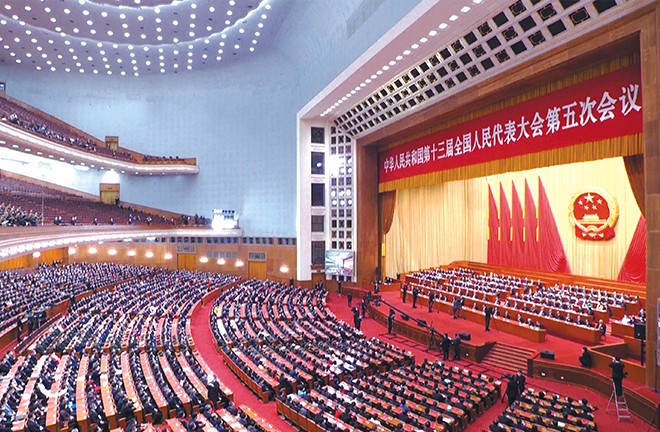Scholars offer proposals and suggestions at Two Sessions

The closing meeting of the fifth session of the 13th National People’s Congress is held at the Great Hall of the People in Beijing, March 11. Photo: CFP
In March, China’s “Two Sessions” took place in a crucial year for the country’s march toward modernization.
The “Two Sessions,” the annual session of the National People’s Congress (NPC), and the annual session of the Chinese People’s Political Consultative Conference (CPPCC) National Committee, are of great importance in the country’s political calendar. NPC deputies and CPPCC members from the fields of philosophy and social sciences actively offered proposals and suggestions.
Cultural and environmental protection
It is the 10th year that Wang Wei, a Member of the Chinese Academy of Social Sciences (CASS), has served as an NPC deputy. As an archaeologist, Wang focuses on cultural relics, and cultural heritage protection and publicity.
Wang reflected on the Western-culture themed amusement parks that have been built in China in recent years. At this year’s Two Sessions, he proposed that a large-scale amusement park could be built to “tell China’s story well.” For example, in ancient cities such as Beijing and Zhengzhou, parks with the theme of refined traditional Chinese culture can be built, leveraging these places’ profound historical and cultural resources and modern digital technologies, such as AR and VR. In this way, tourists could appreciate the Chinese civilization’s long-lasting charm through immersive experience.
Wang Yanxin, a CPPCC member and president of China University of Geosciences, focuses on issues in the fields of energy, pollution prevention, resource and environmental security, and education on nature. His proposals ranged from macro to micro levels, calling for resource conservation legislation, and recommending the implementation of express delivery packaging sorting and recycling.
Wang Yanxin expressed his hope to see more sustainable development and utilization of the earth’s resources, more effective promotion of green growth, and improvement of the quality of green lifestyles, thus realizing the harmonious coexistence of man and nature.
Rural vitalization
As China has completed building a moderately prosperous society in all respects, China’s policy now prioritizes consolidating and expanding the achievements of poverty alleviation and effectively aligning them with rural vitalization. Dynamic monitoring and assistance mechanisms have been strengthened, and rural construction and rural governance have seen remarkable achievements.
Wei Houkai, an NPC deputy and the director of the Rural Development Institute at CASS, said that rural residents’ income increased by 9.7% in 2021, which was 1.6 percentage points higher than that of urban and rural residents combined, and 2.6 percentage points higher than the income increase of urban residents. In particular, the income of rural residents in counties that have eradicated absolute poverty increased by 10.8%, which was 2.7 percentage points higher than that of urban and rural residents nationwide.
In 2020, Wei and his team extensively conducted a comprehensive survey of rural China. He was delighted to find that many villages that first attained wealth could drive the joint development of neighboring villages, which has become a new policy focus area.
“Under the new situation, it is necessary to accelerate the joint development of villages and lay the institutional foundation for promoting common prosperity in rural areas,” Wei said. Wei suggested that village divisions should be repaired through their joint development, so that those who have first attained wealth can help latecomers catch up.
Wei suggested collecting exemplary cases of joint development from villages across the country, and carrying out pilot demonstrations of joint development in villages from different regions and types on the basis of summarizing experience.
In addition, Wei suggested intensifying efforts to revitalize rural collective assets and develop and strengthen the collective economy in townships. Moreover, it is necessary to encourage in-depth cooperation between the state-owned economy and the collective economy, and in-depth discussions of how the state-owned economy, such as state-owned industrial parks and large state-owned enterprises, can participate in rural vitalization and cooperate with the rural collective economy.
Talent is key to rural vitalization. Gong Shengsheng, a CPPCC member and a professor from the College of Urban and Environmental Sciences at Central China Normal University, suggested providing support for rural enterprises by financing, land, water and electricity, and taxation.
Gong suggested attracting local talent to return to their hometowns and start businesses through attractive policies, financial support, and emotional appeals. It is also important to strengthen school-enterprise connections, establishing a local talent training model which integrates production, teaching, and learning.
Edited by JIANG HONG
